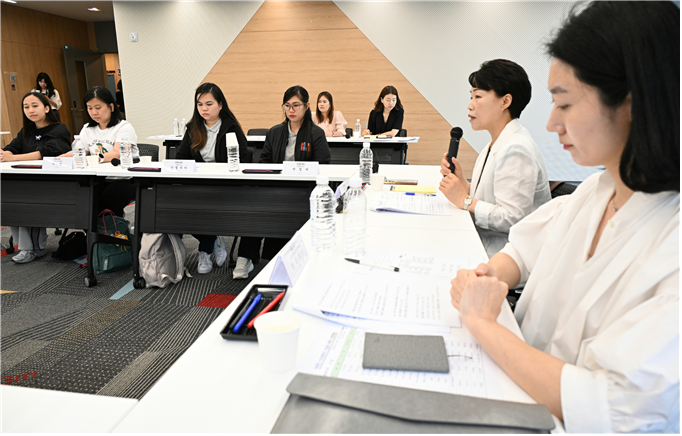On the morning of September 17, the Seoul Metropolitan Government held its first official meeting with foreign caregivers following the conclusion of the pilot program (September 3, 2024 – February 28, 2025). The meeting aimed to hear directly from the caregivers about their challenges and gather suggestions for improving the program.
Following the open discussion, the city also hosted a separate closed-door meeting with service providers to exchange more in-depth views on potential improvements to the program.
Listening to On-the-Ground Voices
The meeting was attended by four “group leaders” — foreign caregivers who not only provided household services directly to families but also collected feedback and concerns from fellow caregivers in the field.
Participants highlighted some of the positives of living and working in Korea, including the kindness of the families they served and the convenience of the public transportation system. While they mentioned occasional misunderstandings due to language barriers, they noted these were usually resolved with help from their service providers.
Many caregivers shared positive experiences of being welcomed as part of the family by the households they worked with. However, they also expressed a need for better communication support, noting that reliance on English often posed limitations.
Feedback from Service Users
Families receiving the services also responded positively. They appreciated the stability provided by service providers, who handled employment and management of the caregivers. The relatively young age of the caregivers allowed for more active and dynamic care services.
However, there was some confusion among families regarding the scope of work due to the title “caregiver (가사관리사),” suggesting a need for clearer job descriptions.
Key Areas for Improvement
Based on the feedback, Seoul City has identified several areas for improvement:
- Enhanced labor-management communication through monthly meetings.
- Additional human rights support channels for foreign caregivers.
- Guaranteed maximum working hours of up to 52 hours per week.
Proposal for National-Level Support
Seoul also plans to submit a formal proposal to the central government to incorporate foreign caregivers into the national public childcare support system. This comes in response to public concerns about the affordability of hiring legal E-9 visa workers, who must be paid minimum wage and are protected by labor laws.
The city is proposing to include foreign caregivers in the Ministry of Gender Equality and Family’s “Public Childcare Support Program,” which subsidizes 15% to 85% of service fees based on household income levels.
A Broader Vision for Care Support
Sun-soon Kim, Director of Seoul’s Department of Women and Family Policy, stated:
“The foreign caregiver program is not about hiring cheap labor. It should serve as a meaningful care support option for families in need. For low-income households, we aim to connect this program to existing public care subsidies so that support is available based on income levels. We will continue serious discussions with the central government to expand this into a full-scale national initiative.”
